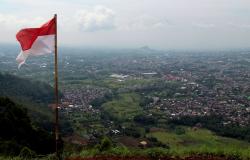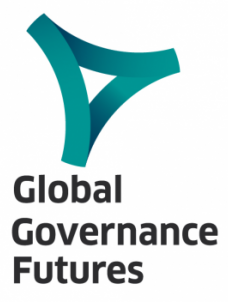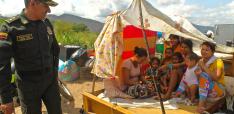Overlooked Opportunities for Irregular Migrants in Indonesia - a Conversation with Fransisca Christanti

Fransisca Christanti, migrant care assistant with the psychosocial division of the International Organization for Migration (IOM) and a GGF 2030 Fellow, discusses the issue of mental health among migrants and refugees in Indonesia.
1. Recently, we have seen increasing reports of mental health issues among migrants and refugees in Indonesia. What is behind these mental health issues?
Although Indonesia has hosted more than 15,000 irregular migrants as a transit country, it is not a signatory to the 1951 Refugee Convention and therefore has no obligation to abide by it. A 2016 Presidential Decree makes Indonesia’s duty to rescue, evacuate, monitor, register, and accommodate refugees explicit, meaning the government must rescue asylum seekers if they reach Indonesian waters by boat. But, there the decree does not specify asylum seekers’ post-evacuation rights. Consequently, unlike other countries where migrants and refugees usually live in UNHCR camps, irregular migrants and refugees in Indonesia live in housing facilities managed by the Indonesian immigration department or International Organization for Migration (IOM). They are prohibited from working formally and earning an income and are given extremely limited access to welfare, health, education, and other social services that are available to Indonesian citizens. As such, they have to live with little means while waiting for resettlement. What is more, chances of resettlement within a third country are only getting smaller, as international refugee politics continues to shift. Political action and inaction manifests itself as unsupportive policy responses in the country of destination and a lack of adequate engagement in such situations by other important actors. Returning to their countries of origin is not an option for many, due to prevailing life-threatening situations. Many of them have lived through these difficult conditions for years.
Migrants and refugees in Indonesia face protracted periods of waiting without any certainty about what comes next, as well as the daily struggles of living in a restrictive environment. Their position of uncertainty and insecurity leads to mental health issues such as loneliness, post-traumatic stress disorder, anxiety, depression, and suicidal thoughts.
 2. Are there any examples successes when migrants and refugees proactively pursue their own initiatives to change their circumstances?
2. Are there any examples successes when migrants and refugees proactively pursue their own initiatives to change their circumstances?
There is a success story from refugees in Cisarua, Indonesia: Driven by the need to provide proper education for their children, refugees transitioned from living as individual families to living as a community, and they initiated a refugee-run school in 2014. This school has various projects for all community members, including recreational and vocational activities. During this process, they have been able to build community resilience and bounce back together in order to improve their living conditions and create a more supportive environment for their community. With no sufficient access to financial aid, they must rely on family or diaspora support. Nonetheless, they have improvised and successfully changed their circumstances with incredible success. Togetherness and solidarity, along with a problem-solving attitude, confidence, and creativity, are the result of their hard work and unique ability to perceive their situation differently, instead of giving up. Their strength derives from their willingness to collaborate with one another despite their differences, to critically exercise their circumstances and opportunities, and to conceptualize feasible solutions to their problems while carrying them out strategically. As a result, they can regain a sense of activeness, normal daily life, and belonging to a lively community – which is beneficial for both their mental and physical health.
3. You have begun to support migrant and refugee community-driven intervention through the Youth Learning Centre (YLC) in Pekanbaru, the capital of Indonesian province Riau. What does the YLC do to facilitate interaction between local communities and migrants/refugees and how has that played out?
YLC aims to empower migrants and refugees to have confidence in their own capacity and in their initiatives. Through YLC, we attempt to create a supportive environment for irregular migrants in Pekanbaru to make direct contributions towards the development of their own communities. Initially, YLC provides informal education and vocational training for refugee children and youth, as well as a platform for adults to transition from living as individual families to living as a community. To facilitate interaction with local communities, YLC collaborates with local youth organizations and conducts cultural exchange events. Through those events, migrants, refugees and locals are able to learn about each other’s cultures. By providing guidance for irregular migrants to help them get to know their surroundings better and encouraging them to connect with receiving societies prior to the events, the YLC has had great success. Though YLC is still very young, there are indications that the facilitation and guidance it provides has had positive impacts within local communities. For example, there is less awkwardness or suspicion towards migrants and refugees from local youth communities. Also, as more local people accept members of the refugee community as their friends and then treat them like family, there are visible signs of increasing interest in migrants’ and refugees’ culture.
4. What can Indonesia and its people gain from social integration and the inclusion of migrants and refugees?
For Indonesia, refugees’ lack of formal work rights is a waste of human capital. Many of them are highly skilled professionals, and some even possess unique expertise, yet their knowledge, skills, perseverance, and motivation go unused. They are in the country for years and require external assistance as well as local government and society’s support to survive without being able to work. Some might say they are a burden, but this ‘burden’ can be transformed into societal contribution when refugees contribute through productive activities and become assets to Indonesia, supporting its citizens’ pursuit of prosperity. Many locals are becoming more open to recruiting refugees informally for work such as mechanics, carpentry, and private tutoring or cooking. This indicates that local businesses have a need for potentially lower-waged labor. In Makassar, the largest city in eastern Indonesia and the capital city of South Sulawesi province, for example, aiming to empower refugees and enable them to benefit the local economy, the city government collaborated with UNHCR, South Sulawesi Red Cross, and the Association of Hotels and Restaurants in Indonesia (PHRI) to provide capacity-building programs for refugees such as trainings and internships at local restaurants in which they are given roles as assistant chef or server. Finally, the image of Indonesia as a generous state that is friendly to victims of humanitarian tragedy may attract more positive attention from the international community.
Fransisca Christanti is a Program Assistant II at the Psychosocial Division of International Organization for Migration (IOM) in Pekanbaru, Indonesia. She is a Global Governance Futures 2030 Fellow. The views expressed here are her own.
Image credit: Prayitno / Thank you for (12 millions+) view via Flickr (CC BY 2.0)

